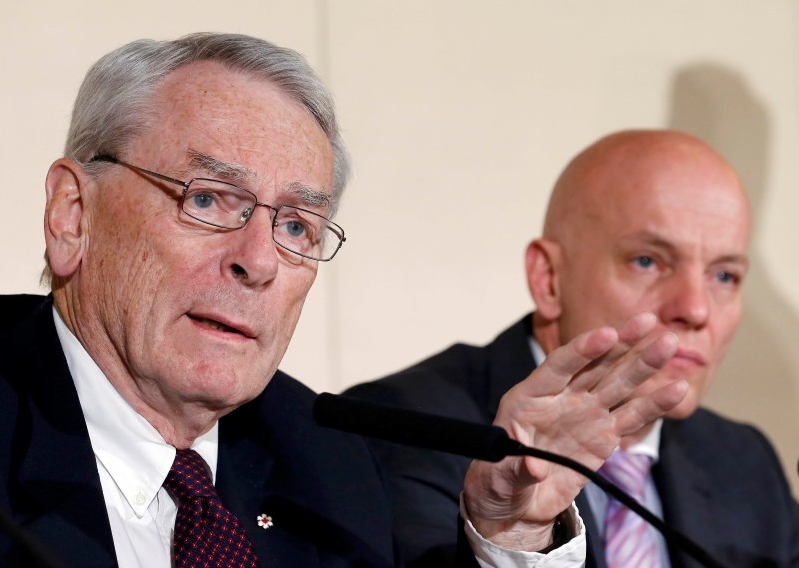
An international anti-doping commission recommended on Monday that Russia's Athletics Federation be banned from international competition over widespread doping offences, a move that could see the powerhouse Russian team excluded from next year's Rio Olympics.
Russian sports minister Vitlay Mutko said there was no evidence for the accusations against the Federation.
The commission, set up by the World Anti-Doping Agency (WADA), found however a "deeply rooted culture of cheating" in Russian athletics. But it also identified what it called systemic failures in the global governing body, the International Association of Athletics Federations (IAAF).
"These are dark days," said IAAF President Sebastian Coe after publication of the long-awaited report. He gave Russia until the end of the week to respond to the accusations.
Dick Pound, former WADA President and head of the commission that produced the report, referred to an unprecedented corruption scandal now shaking soccer's governing body, FIFA.
"I hope all sports will look at their governance and their anti-doping systems because their existence may be at risk," he told a news conference. "public opinion is going to move towards the view that all sport is corrupt."
The scandal revolves around accusations that officials demanded money from top athletes, with the connivance of coaches, to 'bury' medical tests from Russian athletes that showed drug use to enhance performance.
The international police body Interpol said it would coordinate a global investigation into suspected corruption and doping in athletics - a scandal some believe could match in its ramifications the widening graft affair at FIFA, where president Sepp Blatter has been suspended and 14 officials and marketing executives indicted.
The commission said in its report that the London 2012 Olympics had been "sabotaged" by the widespread inaction of international and national anti-doping authorities.
"For 2016 our recommendation is that the Russian Federation be suspended, in fact one of our hopes is that they will volunteer that, so that they can take the remedial work in time to make sure that Russian athletes can compete under a new framework if you like," Pound said.
Russia finished second behind the United States in the medal table at the 2012 Olympics, with 17 medals, eight of them gold, and has long been one of the chief players in track and field.
In one sense at least, the scandal could prove more compromising than the FIFA affair. There has never been any suggestion that FIFA corruption has affected results on the pitch, at the World Cup, for example.
"It's worse than we thought, It has the effect of factually affecting the results on the field and play and athletes, both in Russia and abroad, are suffering as a result," Pound said. "It maybe a residue of the old Soviet system...they must stop it and make a new start."
"I hope they'll say this is an opportunity to get rid of the old system, get rid of the old coaches and change their ways. If they (Russia) do the surgery, and do the therapy, I hope they can get there (Rio de Janeiro) and compete."
A decision to suspend Russia could be taken only by the IAAF.
Acting President of the Russian Athletics Federation, Vadim Zelichenok, talking to Reuters by telephone, said: "It is only a recommendation...But I cannot say if the IAAF will follow this."
Russian Sports Minister Vitaly Mutko, referring to the report's assertion that 1,417 anti-doping samples had been destroyed before a WADA visit to Moscow, said they had been destroyed at WADA's request.
Russia hosts next year's World Cup. The decision to award Moscow that competition is under investigation by Swiss police as part of a broader graft inquiry at FIFA.
COVER-UPS
Corruption has infected many sports. The International Olympic Committee was hit by a graft scandal 15 years ago, while cricket and cycling have also been tainted.
The reach of graft in global sport might in part be explained by a huge influx of sponsorship in recent decades into bodies lacking effective governance and supervisory procedures. That very financial backing could now be put at risk.
"I think the credibility of sport has taken some fairly serious body blows in the last few months with FIFA and its particular forms of corruption and now the IAAF and these are two of the most important sports in the world," Pound said.
The IAAF said steps would be taken to ban the Russian Athletics Federation (ARAF).
"The information in Wada's Independent Commission Report is alarming. We need time to properly digest and understand the detailed findings included in the report," IAAF president Sebastian Coe said in a statement.
"However, I have urged the IAAF Council to start the process of considering sanctions against Araf (Russian Athletics Federation). This step has not been taken lightly.
The report said it had recommended sanctions against five athletes, four coaches and one doctor, "not previously the subject of disciplinary proceedings by the IAAF, AFAF or Russian Federation". But it gave no details of the accusations.
Last week the IAAF's former long-serving president Lamine Diack was placed formal investigation on suspicion of corruption and money laundering.
The 82-year-old Senegalese is alleged to have received over one million euros ($1.09 million) in bribes in 2011 to cover up positive doping tests by Russian athletes, the office of France's financial prosecutor said.
The suppression of drug test results in return for bribes would make a mockery of the huge investment by world athletics in technical measures to detect drug use and ensure fairness.
Coe told Reuters in an interview that the IAAF had tested more than 5,000 athletes since 2009; proof, he said, that the organization was serious about making the sport clean.






